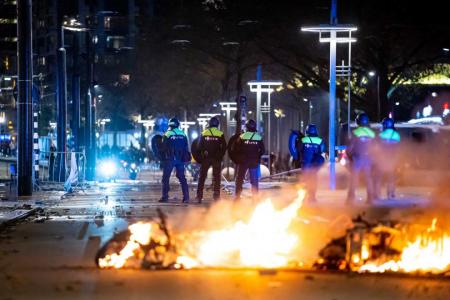Online conspiracies fuel Dutch Covid-19 unrest
Groups on Facebook spreading misinformation have 789k members in country of 17 million
THE HAGUE: When Covid-19 riots rocked the Netherlands for the second time in a year, Mr Ricardo Pronk was there to live-stream it all to his followers on social media.
The 50-year-old anti-vaccination activist administered a Facebook group with 10,000 followers, which had shared a call for a demonstration in the port city of Rotterdam on Nov 19 that later turned violent.
The group, which was recently removed by Facebook, is part of a network of conspiracy theorists and Covid-19 deniers on social media reaching as far as the Dutch Parliament, whose influence has sparked concern among experts.
For Mr Pronk, vaccines "are weapons made to kill". He also embraces the QAnon conspiracy group's narrative about "satanic child abuse" by a "globalised elite".
But the unemployed former computer technician, who had chosen a banner for the group with a lion against a backdrop of flames, rejects any responsibility for the unrest in the Netherlands.
Five people were shot when police opened fire in Rotterdam, and riots spread around the country for the next three days.
"Violence is not the best way, of course not. The best is to do things peacefully," Mr Pronk told AFP.
Both in January, during the Netherlands' worst riots in 40 years over a curfew, and last week's unrest, social media were used not only to organise protests but also to spread disinformation.
"What is unique about the Netherlands is that we have repeatedly seen Covid protests turn into riots just this year," said Mr Ciaran O'Connor, an analyst at the Institute for Strategic Dialogue in London, which specialises in countering radicalism.
While Prime Minister Mark Rutte has branded rioters "scum" and "idiots", Mr O'Connor pointed the finger at the epidemic of conspiracy theories on the Internet in the Netherlands.
On Facebook alone, the top 125 groups disseminating false information about Covid-19 saw a 63 per cent rise in followers in six months, comprising 789,000 members in this country of 17 million people, an ISD study said.
Telegram groups during last week's riots were filled with plans for demonstrations, calls for riots, along with messages targeting Muslims, Jews and gay people.
The social media groups "usually don't call for violence but they may accept it as part of the solution", said Mr O'Connor. "The anti-vax and anti-Covid movement is creating a space allowing for other forces to engage and express their frustration in a violent way."
Dutch authorities blamed the riots on a variety of culprits, ranging from frustrated youth to football hooligans and genuine coronavirus protesters - but they also underlined the importance of social media in organising them.
In a country where 85 percent of adults are vaccinated, the anti-vax movement "is a clear minority group", said Dr Claes de Vreese, professor of political communication at the University of Amsterdam. - AFP
Get The New Paper on your phone with the free TNP app. Download from the Apple App Store or Google Play Store now



